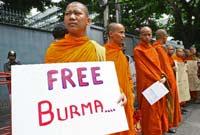Burma, Blogging and Creedon

This column has never been all that enthusiastic about the impact, real or potential, of blogging. More often than not I'm the old fart who reckons it's like talking to oneself without the exciting frisson of insanity, and I have only occasionally seen blogs on political matters that don't end up replicating or at least relying upon the same old mainstream sources.
But while I could never get excited about, eg, the bloggers who brought down Dan Rather, the situation that exists, as I write in late September, in Burma/Myanmar is another story entirely. “Heroic” and “important” are perfectly reasonable words to describe the sort of work being squeezed out of that country over the web. By Harry Browne
As has been widely discussed, most images of the crisis have migrated from blogs, themselves evading detection by authorities, on to the likes of Youtube and from there to mainstream online, broadcast and print outlets.
It may not, however, be precisely the “amateurs and hackers defy authority and reveal truth to the world” story that it appears. It will be intriguing if we ever find out how many of the Burmese bloggers and “bystanders” who get images and accounts of military repression out from a closeted country, stuff that could then be picked up by Western news organisations, were and are actually professional journalists. While the crackdown is going on it would not be appropriate for the foreign reporters covering the story from India or Thailand to reveal such a thing.
However, it would be more surprising to imagine that Burmese journalists have not been trying to live up to the ideals of their craft and to get out the truth, by any means necessary – even the means supposedly reserved for the untrained “citizen journalists”.
Who owns progress?
The stories about the politics and journalism of the web, especially at times like these, under the influence of the Burmese experience, tend to assume that somehow bloggers and other web-users are both closer to reality “on the ground”, and more allied to the forces of virtue, decency and progress, arrayed against helmeted troops, geriatric oligarchs, staid state-run propaganda in newspapers, and probably Darth Vader as well. Perhaps the classic case was the Iranian presidential election of 2005, misread by many Western journalists because they were over-reliant on the blogs.
In reality, of course, Darth Vader would probably have the hottest website going.
The now-traditional dichotomy emerged again recently in coverage of Iranian censorship. As most stories put it: “Government agents have raided and closed down influential Iranian news website Baztab, which is critical of hardline president Mahmoud Ahmadinejad.... The website had over the last few weeks had harshly criticised the Iranian government.”
Baztab, though, was scarcely some heroic representative of the progressive “netroots” against an all-power president, but an often reactionary tool of another faction in the Iranian elite. Meanwhile, you wouldn't have found in most of the stories that the government had also closed down two... newspapers, and actual reformist newspapers at that.
Closing down websites is a sexier story now than closing down newspapers. (It helps that journalists outside the country can easily go to baztab.com and click on the English-language version.) But in a society like Iran it remains likely that the latter will reach wider swathes of the population, especially the poor.
 A Creedon to live by
A Creedon to live by
At some silly time in my journalistic past when I was under pressure to spout opinions to a weekly deadline, I wrote less-than-kind things about John Creedon. What was I thinking?
The Radio 1 evening-to-night schedule this season is self-evidently a mess – though at least they got rid of that guy who was always ranting and sighing rudely at his guests – and at the time of writing it still sounds like a building site. But at least at some point after the kids are asleep and the dirty dishes are stacked on the cooker you can find blessed relief in Late Date with Creedon.
It's not that I think he's a brilliant talker – he's from Cork, for God's sake – but with decent music being systematically stripped from the schedule, his programme is as good as it gets. (Who can remember to listen to John Kelly on Lyric in the afternoon?) His Late Date is essentially the station's only programme that seems to have noticed that a great number of the great musicians of the last century are, you know, black.
The oversight by most other RTÉ music programmers – and by most of the people who write about music in Ireland – has real consequences: for example, before her substance and relationship became the dominant story, Amy Winehouse was widely feted as some sort of musical genius by people who should have been old enough to know better.
For their ignorance, I blame Radio 1. More playlists like Creedon's would put her in, ahem, context, and mark ‘Rehab' as simply a quasi-competent joke, the Supremes do tabloid confessional.
You want to hear someone who can do throwback and bring it forward, check out Patti Scialfa's new album, and for no extra charge you get to imagine Bruce Springsteen cringing as his missus documents his many shortcomings. When Amy Winehouse has had a real life instead of a newspaper one, she might do half as well.
